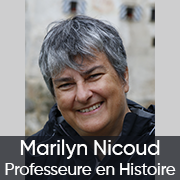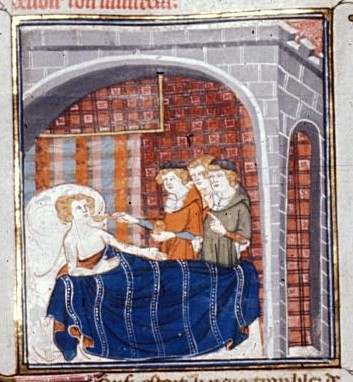[Portrait] Marilyn Nicoud, Professor of History
What is your research about?
I work in the field of the history of medicine and health in the medieval period. My research aims to understand the place and role of medical thought and practitioners in a history of the body, health and hygiene, both on an individual and collective scale. Through the cross-study of scholarly literature produced in universities and courts and the examination of archives that deal with public health issues, the aim is to shed light on the way in which health constituted a major preoccupation of physicians, individuals and political powers in the Middle Ages.

What are your current scientific activities?
Because of the current health situation, I have been asked to participate in various radio programmes that ask questions about the relationship between the Covid-19 epidemic and past pandemicsI have published an article on the plague epidemics, in particular the medieval and modern plague epidemics. I have published an article "The plague and covid-19: the same fight?" in the online magazine AOC-media (Critical Opinion Analysis); I participated in the Midi-History of Bercy on political and medical reactions to the plague in September; I am participating in the Rencontres d'histoire de Blois on the theme of Gouverner (round table of the journal l'Histoire, 10 October) and France-Culture programmes (The Course of HistoryWednesday 7 October; Do you hear the ecoFriday 9 October), in connection with the themes of government and epidemic management.
Why did you choose to work in academic research?
As I have always had a stronger interest in research than in teaching, if I had been asked this question at the beginning of my career, I would have answered that I would have preferred to be a researcher at the CNRS rather than a teacher-researcher at the university.
However, with time, age surely and certainly also because of the unprecedented nature of this epidemic situation, I appreciate being able to pass on and communicate the fruits of my research and reading with "face-to-face" students as they say. Teaching seems to me to be an essential complement to this research activity by offering a perspective of critical look not only at our representations of past societies, but also at the way history helps us to think and understand the present.
What advice would you give to students who want to do research?
My main advice consists of two words that seem essential to me: pleasure and curiosity. It is undoubtedly easy for someone whose career is partly behind him to evoke these key words, which were once delivered to me by Jacques Le Goff, who directed my DEA at the EHESS. If today's economic situation and professional prospects are likely to dampen students' enthusiasm for research, they still seem to me to be relevant, an essential driving force in the life of a researcher and in life itself.
Which object or image from your research best illustrates you?
King Louis VI, known as the Fat Man, in bed and surrounded by his doctorsThis is a rather stereotypical representation of medical practice with several colleagues at the bedside of rich patients. Illuminated manuscript of the Great chronicles of France (London, British Library, ms Royal 16 G VI, copied around 1332-1350 at the request of the Duke of Normandy, future King of France, John II).

Mis à jour le 22 December 2022